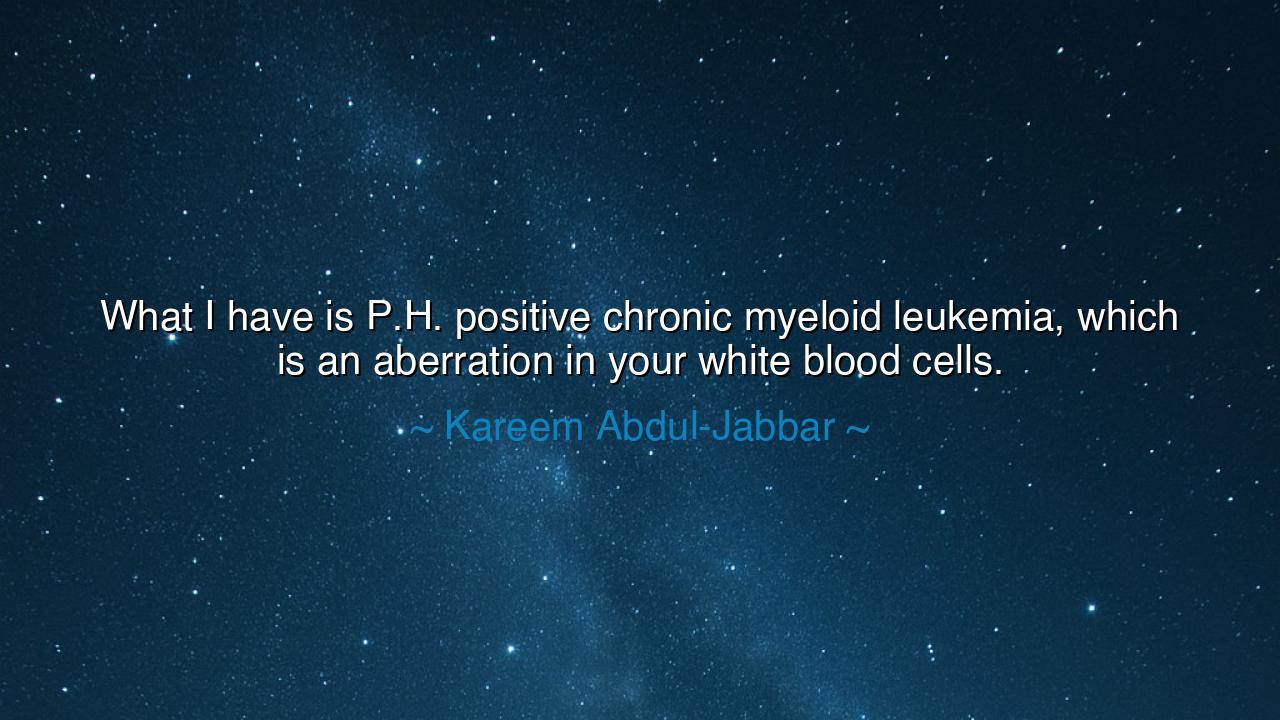
What I have is P.H. positive chronic myeloid leukemia, which is
What I have is P.H. positive chronic myeloid leukemia, which is an aberration in your white blood cells.






The words of Kareem Abdul-Jabbar—“What I have is P.H. positive chronic myeloid leukemia, which is an aberration in your white blood cells”—sound with the quiet dignity of a warrior who names his adversary not with fear, but with clarity. To speak of illness in such terms is to strip it of mystery and cloak it in understanding. It is the voice of one who has faced the storm and chosen not to tremble, but to tell the truth. For when a man names his burden, he begins to master it.
The origin of this wisdom lies in the timeless struggle of humankind with disease. For as long as men and women have walked upon the earth, they have battled sickness in their bodies and despair in their souls. Many chose silence, hiding their weakness in shame. Yet the greater path has always been to face affliction with openness, for only then can healing—whether of body, spirit, or community—begin. Abdul-Jabbar’s words remind us that even the strongest among us are not spared from the frailty of flesh, yet strength is shown in how we confront it.
Consider the story of Lance Armstrong, who, though later shadowed by controversy, first inspired the world when he faced cancer that spread to his brain and lungs. He, too, named his illness, endured the torment of treatment, and returned to the path of endurance. His survival was not simply a medical triumph but an act of defiance against despair. Like Abdul-Jabbar, he showed that illness does not erase the will to live fully—it refines it, forcing the soul to rise above the weakness of the body.
We may also recall the tale of Emperor Marcus Aurelius, who, in his Meditations, wrote often of pain, sickness, and the certainty of death. Yet he counseled himself to accept these as parts of nature, not as enemies. By naming his suffering and understanding its place in the order of things, he transformed fear into acceptance. Abdul-Jabbar’s naming of chronic myeloid leukemia follows this same ancient path: it is not a surrender, but an act of sovereignty over fear.
The meaning of this quote is deeper than medicine. It is about the courage to face one’s reality without illusion. To call illness an aberration is to recognize that life is not always harmonious, that disorder can enter even into the most sacred parts of our being. Yet in naming it, in teaching others what it is, Abdul-Jabbar lifts the burden from shame and transforms it into knowledge. He turns personal suffering into a gift for others, for in speaking, he educates, and in educating, he empowers.
The lesson for us is clear: do not hide from the challenges that dwell within you. Whether it is sickness of the body, wounds of the heart, or shadows of the mind, to name your burden is to begin to master it. Share your struggle with others, for in your openness you may become their teacher, their comfort, their guide. Silence breeds fear, but truth breeds courage.
Practical wisdom calls us to action: care for your health, honor the frailty of your body, and seek knowledge when adversity comes. If sickness should strike, do not let it rob you of dignity; stand as Abdul-Jabbar stood—honest, open, unafraid to speak its name. And in the face of all weakness, remember that the soul is greater than the body, and that even when the flesh falters, the spirit can remain undefeated.
Thus, let Abdul-Jabbar’s words echo not as a lament, but as a teaching: the body may bear aberrations, but the heart may still bear courage. Life is not measured by freedom from struggle, but by how we carry struggle when it comes. And in the act of naming our burden, we teach the next generation how to endure theirs.






TDTham Duong
Abdul-Jabbar’s candid revelation about his chronic myeloid leukemia shines a light on the importance of public figures using their platform to raise awareness for serious health issues. How can the media and healthcare professionals help ensure that the conversation around chronic diseases is less stigmatized and more open, especially for those in the public eye?
HLPham Hieu lan
Kareem Abdul-Jabbar’s diagnosis is a reminder of how even people who seem invincible, like professional athletes, are vulnerable to serious health issues. What does his openness say about the need for better healthcare awareness and how we discuss chronic diseases in the public sphere? Should we be doing more to educate people on these types of conditions?
Hhuyhiu2008
The way Abdul-Jabbar describes his chronic myeloid leukemia—simply as an 'aberration' in white blood cells—shows a level of understanding of the science behind his condition. How can we as a society become more informed about medical conditions like this one, so that we can offer more meaningful support to individuals facing similar battles?
HNTran Thienn Ha Nghiiii
It’s inspiring to see Abdul-Jabbar address his health condition so candidly, but how does the public perception of celebrities change once they reveal such vulnerabilities? Do we, as a society, treat people with chronic illnesses differently once we know about their conditions, and should we?
CQChien Quyet
Chronic myeloid leukemia is a serious condition, and Abdul-Jabbar’s words highlight how sometimes health challenges can be misunderstood or oversimplified. What are the challenges that people with chronic conditions like this face in terms of medical treatment, stigma, and daily life? How can we foster better understanding and support for those living with such conditions?